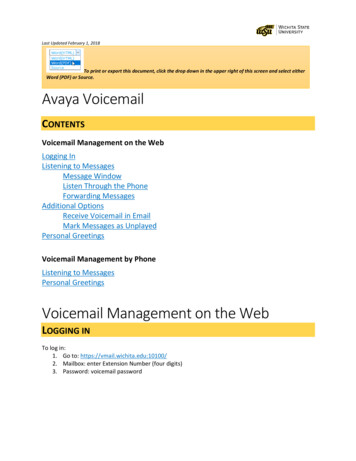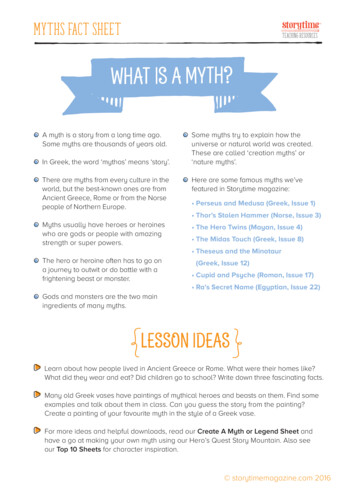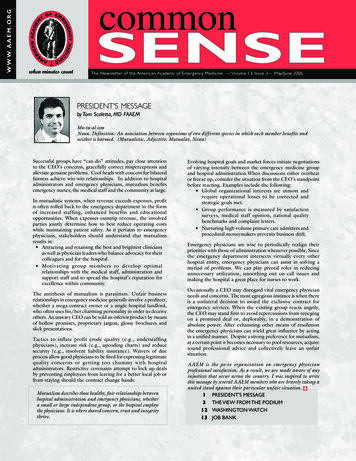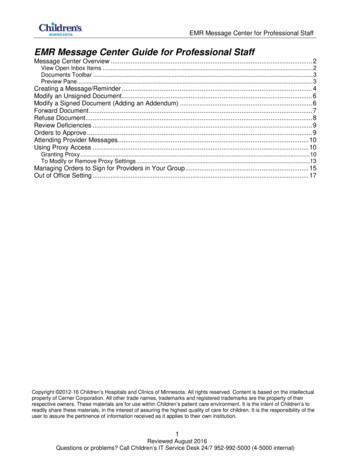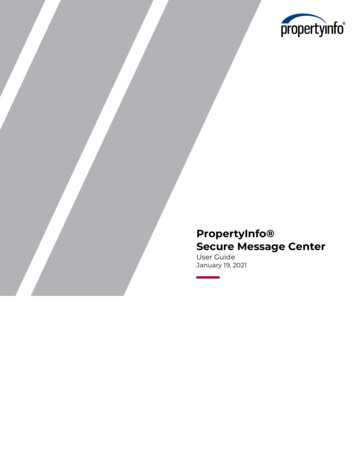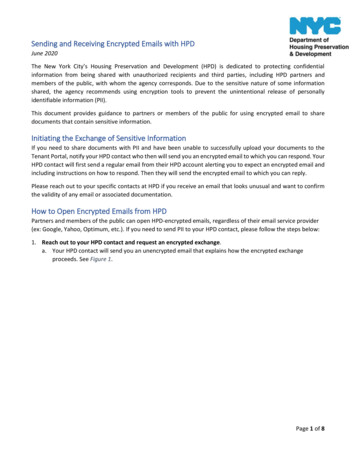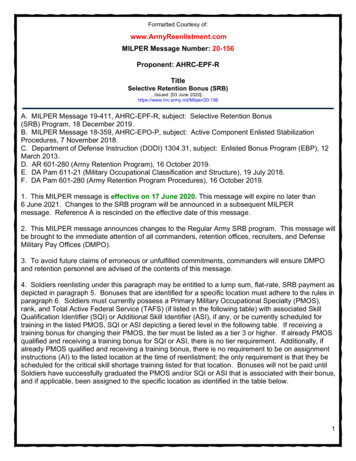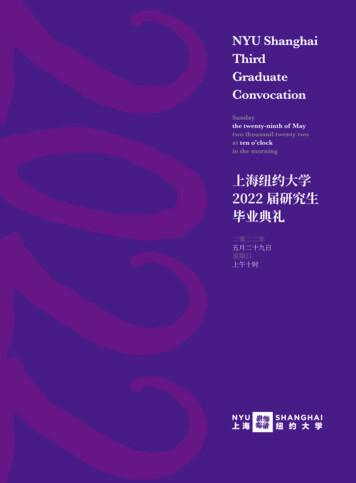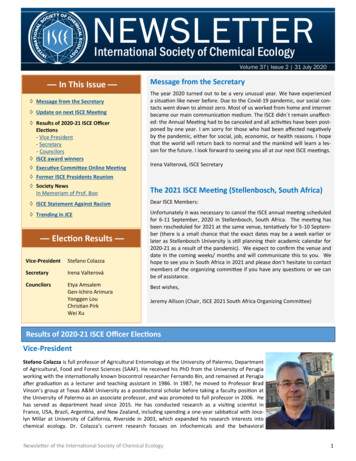
Transcription
Volume 37 Issue 2 31 July 2020— In This Issue — Message from the Secretary Update on next ISCE Meeting Results of 2020-21 ISCE OfficerElections- Vice President- Secretary- Councilors ISCE award winners Executive Committee Online MeetingMessage from the SecretaryThe year 2020 turned out to be a very unusual year. We have experienceda situation like never before. Due to the Covid-19 pandemic, our social contacts went down to almost zero. Most of us worked from home and internetbecame our main communication medium. The ISCE didn t remain unaffected: the Annual Meeting had to be canceled and all activities have been postponed by one year. I am sorry for those who had been affected negativelyby the pandemic, either for social, job, economic, or health reasons. I hopethat the world will return back to normal and the mankind will learn a lesson for the future. I look forward to seeing you all at our next ISCE meetings.Irena Valterová, ISCE Secretary Former ISCE Presidents Reunion Society NewsIn Memoriam of Prof. BooThe 2021 ISCE Meeting (Stellenbosch, South Africa) ISCE Statement Against RacismDear ISCE Members: Trending in JCEUnfortunately it was necessary to cancel the ISCE annual meeting scheduledfor 6-11 September, 2020 in Stellenbosch, South Africa. The meeting hasbeen rescheduled for 2021 at the same venue, tentatively for 5-10 September (there is a small chance that the exact dates may be a week earlier orlater as Stellenbosch University is still planning their academic calendar for2020-21 as a result of the pandemic). We expect to confirm the venue anddate in the coming weeks/ months and will communicate this to you. Wehope to see you in South Africa in 2021 and please don’t hesitate to contactmembers of the organizing committee if you have any questions or we canbe of assistance.— Election Results —Vice-PresidentStefano ColazzaSecretaryIrena ValterováCouncilorsEtya AmsalemGen-Ichiro ArimuraYonggen LouChristian PirkWei XuBest wishes,Jeremy Allison (Chair, ISCE 2021 South Africa Organizing Committee)Results of 2020-21 ISCE Officer ElectionsVice-PresidentStefano Colazza is full professor of Agricultural Entomology at the University of Palermo, Departmentof Agricultural, Food and Forest Sciences (SAAF). He received his PhD from the University of Perugiaworking with the internationally known biocontrol researcher Fernando Bin, and remained at Perugiaafter graduation as a lecturer and teaching assistant in 1986. In 1987, he moved to Professor BradVinson’s group at Texas A&M University as a postdoctoral scholar before taking a faculty position atthe University of Palermo as an associate professor, and was promoted to full professor in 2006. Hehas served as department head since 2015. He has conducted research as a visiting scientist inFrance, USA, Brazil, Argentina, and New Zealand, including spending a one-year sabbatical with Jocelyn Millar at University of California, Riverside in 2003, which expanded his research interests intochemical ecology. Dr. Colazza’s current research focuses on infochemicals and the behavioralNewsletter of the International Society of Chemical Ecology1
the Executive Committee decided to accept both candidatesand for the term of 3 years, the number of councilors will inecology of plant-insect herbivores-insect parasitoid interactions crease again (17 instead of 15).in a multitrophic context, and on the chemical ecology of plantVOCs in a multitrophic context. He was elected as a fellow of the Etya Amsalem is an Assistant ProfesItalian Academy of Entomology, and the Academy of Georgofili. sor of Entomology at PennsylvaniaHe currently serves as an associate editor for BioControl, and as State University. She received herspecialty chief editor of Frontiers in Ecology and Evolution in the MSc and PhD at Tel Aviv University,section of Chemical Ecology. Over the last two decades he has Israel, where she studied the chemiled several international collaborations and research groups, cal regulation underlying worker stedirected undergraduate and post-graduate students, and taught rility in bumble bees with Abrahamundergraduate and postgraduate courses in a range of subjects. Hefetz. Supported by the BinationalHe has published about 200 scientific articles, and edited a book Agriculture Research and Developon insect chemical ecology. He has been member of ISCE since ment fund of Israel and US, she com1992, and served as ISCE councilor from 2009-2012.pleted a postdoc at Penn State University with Christina Grozinger, expanding her work to studythe genomic mechanisms regulating diapause and carbon dioxSecretaryide in bumble bee queens. After a short stop in the University ofHaifa, Israel, where she worked on the genetic regulation of soIrena Valterová is a professorcial organization in fire ants with Eyal Privman, she rejoined theemeritus at the Institute of Ordepartment of Entomology at Penn State University as a facultyganic Chemistry and Biochemismember.try, Academy of Sciences of theEtya’s research interests lie in the intersection of chemicalCzech Republic in Prague. Sheecology, physiology, genetics, behavior and evolution. Her prigraduated in organic chemistry atmary work focuses on pheromones regulating reproduction andthe Faculty of Science of thesocial behavior in insects, the molecular mechanisms underlyingCharles University in Prague. As apheromone production and perception, and the evolution ofPhD student, she worked on isochemical signals. While working with various social insects, herlation and structure elucidation ofmain model system are bees and part of her work is dedicateddefense substances of termiteto study and improve bees’ health. Her recent work in the areasoldiers under the supervision ofDr. J. Vrkoč. As a post-doctoral research fellow, she spent two focuses in diapause, a bottleneck for survival in annual bees, andyears at the Royal Institute of Technology in Stockholm, Sweden. in the impact and mechanisms underlying carbon dioxide narcoShe worked in the group of Prof. T. Norin on enantioselective sis, a method commonly used to bypass diapause in bumbleseparations using a two-dimensional gas chromatography. She bees. Etya has published more than 20 research publications inapplied this technique in the determination of enantiomeric pu- some high-ranking journals, such as Molecular Ecology, Genomerity of monoterpene hydrocarbons isolated from insects and Biology and Evolution and Proceedings of the royal society-B.plants. She teaches topics “Biologically active natural products” She was recently awarded NSF-CAREER for her work on sterilityand “Plant protection and agroecology” at the Czech University inducing mechanisms in social insects. Etya served as a guesteditor in the Journal of Chemical Ecology for an issue on pheroof Life Sciences in Prague.Her latest research included chemical communication in mone regulating reproduction and co-organized a session onbumblebees and biosynthetic formation of male marking phero- social insect chemical communication in the annual meeting ofmones. She published 158 original scientific papers, 6 review the Society in Atlanta.articles, and 4 patents, mainly in the field of chemical ecology.As a principle investigator of a successfully solved project Since his PhD Gen-Ichiro Arimura“Pollinators as a Crucial Factor in Agriculture“ she was awarded worked on induced defenses inthe Prize of the Technology Agency of the Czech Republic and plants. Already one of his first publications has become a milestone inthe Prize for Usefulness of Solution in 2015.Irena is an active member of the Czech Chemical Society Chemical Ecology, since this reprewhere she works in the Executive Committee. She became an sented the first combination ofISCE member in 1993 and she served as councilor in 2002-2004. Ecology with molecular BiologySince 2014, she has been serving the ISCE as secretary. The ISCE concerning induced volatiles. AfterPresident, Past-President and Vice-President nominated her as a his PhD he joined the lab of JörgBohlmann in Canada, followed by acandidate for Secretary for one more term.period in Wilhelm Boland s groupof the MPI of Chemical Ecology inNew CouncilorsJena. In 2008 he returned to JapanSimilarly to last year, the election results were exceptional. and became an Assistant ProfessorDue to the equal number of votes on the 4th and 5th position, at the Ecology Center at the Kyoto University, Japan. Since 2013Vice-President, continuedNewsletter of the International Society of Chemical Ecology2
New Councilors, continuedhe is an Assistant Professor at Kyoto University, followed by anAssistant Professor at Tokyo University of Science in Japan. Since2019 he has been full Professor at Tokyo University of Science.His scientific interests are still focused on the physiology andcontrol of induced plant defenses, but more and more the complexity of the defense regulation has become his interest. Genwas co-organizer of the ISCE meeting in Kyoto 2017 and has published a number of seminal papers in the field. He has a broadoverview of the field of Chemical Ecology and committed to ensure a healthy future for the Society.Yonggen Lou is a QiuShi distinguish Professor at theZhejiang University locatedin Hangzhou, China. Hereceived his PhD (infochemicals in host selectionbehavior of Anagrus nilaparvatae) in 1999. He completed his postdoc training inMax-Planck Institute ofChemical Ecology (MolecularEcology) in Jena, Germany,then worked as a visitingscientist in the Laboratory ofProf. Ted Turlings at the University of Newchatel, Switzerland.Currently he is the Department head of Plant Protection atZhejiang University. Prof. Lou primarily works on molecular interactions between plants and insects including molecular mechanisms of plant defense responses; plant hormone signaling;direct and indirect defenses; tritrophic interactions and rice insect pest management. He has published over 130 research papers in some high impact scientific journals, such as NaturePlants, PNAS, Ecology Letters, eLife, Plant journal, Plant Physiology, New Phytologists, and Molecular Plant, etc. Moreover, hehas received numerous national and international awards, with15 patents granted from his research. He served as an APACEcouncilor during 2011-2015 and was the Chair of the 2019APACE meeting in Hangzhou. He is currently serving as the President of Chinese Chemical Ecologist Association and the Secretary of APACE. He also serves as editorial board members forPLOS One, Insect Science and Journal of Integrative Agriculture,etc.joined Professor Moritz’s group at Halle University. In 2005 hejoined Professor Crewe’s lab at the University of Pretoria. In2006 he was rated among the TOP 50 German researchers in thefield of Behavior. In 2009 he accepted a faculty position in theDepartment of Zoology and Entomology, two years later he waspromoted to Associate Professor and subsequently a full Professor since 2015. In the same year, he was elected to the Academyof Science of South Africa. His main research interest is on socialinsects, using a multi-disciplinary approach by combining mathematics, chemistry, behavioral studies, population analysis andmolecular ecology. His focus lies in the reproductive division oflabor in social insects, especially honeybees and the resultingpotential conflicts among members of an insect colony and therole of chemical ecology in resolving these conflicts. ChemicalEcology of African honeybees, stingless bees and ants play a significant role in his research. Prof Pirk also uses in his work infinding sustainable and viable solutions to Africa’s big healthproblems, like vector borne diseases. The chemical ecology workon disease vectors like mosquitoes, tsetse flies and those oncrop protection are done together with colleagues at the International Centre for Insect Physiology and Ecology in Kenya.Moreover, researching self-organization in social insects, theorganization of groups, mechanisms of coordination and taskallocation and the role and means of communication in achieving coherent collective behavior, has applications in industrialprocesses. Another field of interest is the interaction and coevolution between hosts and parasites/pathogens for examplethose between the honeybee and small hive beetle/brood diseases. Christian leads the Social Insects Research Group, which isa vibrant group of more than 20 members including faculty, postdocs and post graduate students.Wei Xu is a senior lecturerin Entomology in MurdochUniversity, Western Australia. He has been studying insect chemical ecology for over 15 years, with abroad objective to understand the molecular mechanisms and evolution ofinsect chemosensory systems. His long-term goal is to developmore efficient and environmentally friendly pest control strategies.During his PhD study on insect olfactory systems with Professor Walter Leal at UC Davis, he explored the moth and mosquito olfactory proteins. Then he came to Australia with anChristian Pirk is a full Professor inOffice of the Chief Executive (OCE) Fellowship to join CSIRO Ecothe Department of Zoology andsystem Sciences in Canberra, where he continued his postdocEntomology at the University oftoral studies on insect gustatory systems. He joined MurdochPretoria and a member of theUniversity from 2015 as a lecturer and built his insect chemicalAcademy of Science of South Afriecology lab in Perth, Western Australia. In 2016, He receivedca. Christian did his PhD betweenDiscovery Early Career Researcher Award (DECRA) from Australia2000-2002 under the supervision ofResearch Council (ARC) for his research on insect chemical ecolProf R. Hepburn at Rhodes Univerogy. His research is trying to answer the questions: how insectssity (Grahamstown, South Africa).detect their host; why they prefer one host to another; howThereafter, he was a postdoctoral fellow in Professor Tautz’shosts defence themselves and how to apply insect-host interacgroup at the University of Würzburg (2002-2004). In 2005 hetion study into insect control? He has published over 30 peerNewsletter of the International Society of Chemical Ecology3
New Councilors, continuedreviewed papers in journals including PNAS, BMC Biology,Scientific Reports, Journal of Chemical Ecology and Insect Biochemistry and Molecular Biology. He has established strongcollaborations with scientists from Australia, Europe, US, andAsia. Wei Xu became an ISCE member in 2012 and has attendedand co-organized symposiums at several ISCE meetings sincethen. He is also an ordinary member in Australasian Associationfor ChemoSensory Science (AACSS) and a member in Asia-PacificAssociation of Chemical Ecology (APACE). In the 35th ISCE annual conference in Atlanta, US, he chaired a session “MolecularMechanisms in Terrestrial and Aquatic Chemical Ecology”.Congratulations to all elected officers!ISCE Award WinnersThe 2020 winners are Stefan Schulz (ISCE Silver Medal) and Aleš Svatoš (Silverstein-Simeone Award).Their introduction is below. The 2021 winners areGerhard Gries (ISCE Silver Medal) and Paulo Zarbin(ISCE Silverstein-Simeone Award). The winner of the2020 Early Career Award is Tobias Züst and the newlyestablished Applied Chemical Ecology Award is givento John Borden. The introduction of winners selectedin 2020 will be published in the next issue. The winners of 2020 and 2021 awards are expected to givetalks at the next ISCE Meeting.The 2020 ISCE Silver Medal to Stefan SchulzStefan Schulz is an organic chemistwhose interests shifted him towardsChemical Ecology. He is particularly interested in the chemically mediated communication between organisms and themolecules used for this purpose. Hestudied chemistry under the guidance ofWittko Francke at the University of Hamburg, finishing with a dissertation on danaid butterfly pheromones. As a postdoc he worked with Jerrold Meinwald onthe biosynthesis of arctiine moth pheromones from alkaloids.After some time in Hamburg, he moved to the Technische Universität Braunschweig in Germany, where he is Full professorand heads the Institute of Organic Chemistry.Stefan's research interests are the identification, synthesis,biosynthesis, and function of compounds used in chemical communication systems of various organisms. A special feature ofhis work is the structural elucidation of substances in smallamounts, to which he has made important contributions, usuallycombining different techniques. He likes to go to unexploredNewsletter of the International Society of Chemical Ecologyground, few people have worked on before. For example, he andhis research group succeeded in identifying the first and furtherspider pheromones, the structural characterization of ether lipids on spider silk, collembolan-produced pesticides and terpenelipids of collembola, β-lactones as pheromones etc. He alsostarted the systematic investigation of volatile compounds produced by bacteria and investigates their interactions with otherorganisms.In his work, he does not limit himself to one system, butstudies on different size scales, ranging from alligators to plants,arthropods and bacteria. His contributions to chemical ecologyand organic chemistry are documented in over 240 articles inleading international journals. Least but not last he pursues hisprojects within a broad international scientific network, whichhe enjoys to meet at the annual ISCE meetings. As former president, he always advocate the ISCE to be an important promotorof the field.The 2020 ISCE Silverstein-Simeone Awardto Aleš SvatošAleš Svatoš is organic chemist with abig passion for chemical ecology. Afterwriting his PhD thesis with Prof. OtakarČervinka at ICT Prague on enantioselective Diels-Alder reactions he movedto the Institute of Organic Chemistryand Biochemistry (IOCB) to work inNatural Product Dept. with people likeKarel Sláma, Jan Vrkoč, Ivan Hrdý, andJan Ždárek. Such an environment initiated his shift from synthetic chemiststo chemical ecologist. This transformation was profoundly made during his postdoctoral stay withJerry Meinwald and Tom Eisner at Cornell University in early90ties (1991-1993). At Cornell, he also sharpened his skills inanalytical techniques such as NMR and MS. He was developingmethods (with Athula Attygalle) for structural characterization ofolefinic compounds like pheromones and terpenes using massspectrometry and gas-phase FTIR spectroscopy. In 1996 he wasawarded an Alexander von Humboldt fellowship and workedwith Wilhelm Boland on synthetic/analytical projects and on sexpheromone biosynthesis in Manduca sexta and Bombyx mori inBonn and later in Jena at the newly established MPI Institute forChemical ecology. Since 2002 he is the Head of the Mass Spectrometry/Proteomics Research Group in Jena and continues developing mass spectrometry methods for detection and structural characterization of semiochemicals.Beside work on identification of semiochemicals he alsoapplies proteomic analysis to understand the molecular base ofchemical communication, especially for understanding their biosynthesis, catabolism or degradation. He became famous forapplications of mass spectrometry imaging (MSI) to study distribution of chemicals in/on different tissues and he showed hownon-uniform distribution of glucosinolates on Arabidopsis thaliana directs larval feeding. In follow-up work he definitely provedoccurrence of glucosinolates on leaf surface and so directing4
oviposition of specialized insects such as Plutella xylostella. Recently he focuses on developing methods for MSI under ambientcondition in order to enable observing semiochemical formation/transport/release in action. With high lateral resolution,his team is studying biosynthesis of chemicals in plant tissuewith single cell resolution.As a chemist he enjoys deciphering chemical structure ofnumerous sex pheromones (Cameraria ohridella, Drosophilamelanogaster and other fruit flies). In Jena he continues sexpheromone biosynthesis study in Manduca sexta and he wasable, in a close cooperation with lab of Iva Pichová (IOCB), tocharacterize all important CoA-FA desaturases involved in biosynthesis of very complex sex pheromone blend. Now his teamapplies CRISPR/Cas9 technology to silence them and confirmhow desaturases are orchestrating complex biosynthetic pathway.Aleš is a member of the ISCE from 1993 and he actively participates at most of the ISCE meetings. He organized a Massspectrometry course associated with ISCE meeting in Jena (2007)and an Omics symposium during the last ISCE meeting in Budapest. He published over 250 papers with h-index 50 and receivedover 8700 citations.His personal interests cover collecting of art, photographyand he owns/operates winery “Porta Bohemica” in CzechRepublic, together with his wife Simona and their son Jonáš.Next meetings: 2021 South Africa; 2022 Malaysia; 2023 India.2. Expenses for South African meeting prep-costs will be reimbursed by ISCE. In case there will be any surplus from the 2021meeting, it should be returned to the Society.3. The terms of officers/councilors elected this year are valid.The transition of the presidency will happen virtually in September (suggestion: September 11, virtual ISCE Businessmeeting). Award winners will deliver their plenary talks at themeeting in 2021. The EC will decide later, in cooperation withthe next meeting organizers, whether there will be a call forISCE awards next year.4. According to the bylaws, the business meeting has to approvethe yearly financial report. This can be done either in a virtualmeeting (September 11, 2020) or on the ISCE website (postingthe financial report on the website and ask members to approve/disapprove it). It will be decided per rollam.5. An ISCE EC meeting together with councilors would be usefulto organize virtually before the Business meeting.6. Student travel awards applications of this year will be cancelled, they can be resubmitted next year. The applications willnot be transferred automatically for the next meeting.Reunion of former ISCE PresidentsIn early spring this year, Walter Leal (former ISCE President andSilverstein-Simeone Award and Silver Medal winner) took aninitiative and invited former ISCE Presidents to a Zoom meeting.Minutes of the EC On-line Meeting23 former and current presidents from Brazil, Canada, France,On April 20, 2020, the ISCE Executive Committee had an on-line Germany, Sweden and USA joined the meeting. This was a muchmeeting. Several important issues have been discussed under needed reprieve from the daily workarounds that we all adoptedthe circumstances of the Covid-19 pandemic. The most im- to get things done from home and to keep our lab groups conportant decisions are listed below:nected remotely. On behalf of the participants, thank you toWalter for his initiative to get ISCE members connected in these1. The South African meeting organizers plus ISCE-APACE jointdifficult times.meeting organizers agreed to postpone the meeting by oneyear due to the Covid-19 pandemic.Newsletter of the International Society of Chemical Ecology5
In Memoriam of Professor Kyung-Saeng Boo (10 December 1940 - 14 June 2020)Kye Chung Park, Junwei Jerry Zhu and Tom BakerKyung-Saeng Boo, Entomology Professor Emeritus at Seoul National University, died on June 14 at the age of 79 at a hospital inSeoul, Korea. Prof. Dr. Kyung-Saeng Boo was an exceptional, enthusiastic scientist, a true leader in the field of Insect ChemicalEcology, and to everyone who was fortunate enough to know him, a kind, generous, and warm-hearted man.Prof. Kyung-Saeng Boo was one of the founding members of the Asia-Pacific Association of Chemical Ecologists (APACE) and was its4th president from 2005 to 2007. He was instrumental along with other founders to establish the APACE in 1997 immediately afterthe 3rd Asia-Pacific Conference of Entomology in Taichung, Taiwan, and planned for the first conference of Asia-Pacific ChemicalEcologists in 1999, which was organized by Prof. Jiawei Du in Shanghai, China. He also successfully achieved the publication of thefirst issue of the new journal, Journal of Asia-Pacific Entomology. As a result of these pioneering efforts, chemical ecology hascontinued to grow and flourish in the Asia-Pacific region. The strong bonds he was instrumental in developing between chemicalecology researchers in the region and across the globe have continued to this day. Fittingly, APACE successfully held its 10 thconference last year in Hangzhou, China.Although Prof. Boo’s efforts to develop a thriving chemical ecology research program within Korea successfully drove the fieldin the Asia-Pacific region into global prominence, this journey was not without some profound setbacks. He had to endure thedevastating disappointment of the last-minute cancellation — due to the 2003 SARS-COVID outbreak — of the very first JointMeeting of the ISCE and APACE that was to be held in Korea in 2003, over which he was set to preside as host. True to Prof. Boo’snature, he insisted on declining compensation from the ISCE for the cancellation and absorbed the substantial monetary loss fromhis own pocket, which prevented a significant economic drain on the ISCE budget.Although his colleagues knew him to be quite humble and blessed with a kind and gentle nature, his passion for science madehim an outstanding forward-thinker and leader. These traits found him serving as the President of the Korean Society of AppliedEntomology from 1996 to 1998, Chairman of the Department of Applied Biology and Chemistry, Seoul National University (20002002), Vice-president of the Korean Academy of Science and Technology (2001-2004), President of the Asia-Pacific Congress ofEntomology (2001-2005), Vice-president and president of APACE (2004-2007) and Vice-president of the Korean Federation ofScience and Technology Societies (2005-2011). Despite all these and other time-consuming administrative leadership positions, henever lost his devotion to insect chemical ecology and continued his research, reading and writing right up until his death.Colleagues noted that his passion for reading was all-consuming; he was known to rise at ca. 4 AM each day to start reading. Notsurprisingly, his books entitled “Insect Neurophysiology” (in Korean, 616 pages, published 1989) and “Insect Hormones andPhysiology” (in Korean, 875 pages, published 2005) are still gold-standard textbooks on insect physiology at universities throughoutKorea.During his tenure at Seoul National University, Prof. Boo made the first pheromone identification of the Oriental tobaccobudworm, Helicoverpa assulta, followed by a number of novel characterizations of pheromones and kairomones from variouseconomically important pests in Korea. During the mid-1990s he started to implement his research discoveries, which led to asuccessful pheromone-assisted IPM system in Korean apple orchards. He was also excellent in teaching and supervising, and hislectures were so stimulating that they attracted many talented students, many of whom are now major contributors in Koreanacademies and research institutes. He actively brought world-leading chemical ecologists to Korea by holding various meetings andconferences and developing funding to create a community of Korean chemical ecologists. Soon there were abundant internationalresearch collaborations, testament to his pioneering efforts in developing insect chemical ecology in Korea into its burgeoningpresent-day status.Prof. Kyung-Saeng Boo was born on the 10th of December, 1940 on Jeju Island, Korea. He was the youngest of 12 brothers andsisters on his family’s successful cattle farm and mandarin orchard. But this idyllic start to his life soon plunged into turmoil. Duringthe Korean War his family lost everything and struggled for survival. His father became sick and passed away, and as the situationworsened, it was always Kyung-Saeng’s job to feed the few remaining cattle and cook rice for his mother and sisters coming backNewsletter of the International Society of Chemical Ecology6
from work and for his brothers returning from school. Despite these early hardships, in 1960 the determined young man proudlybecame an agricultural college student at Seoul National University. In those days entering an agricultural school in Korea wasmuch more arduous than entering a medical college. His bachelor studies, focused on an agricultural biology major, were guidedby his supervisor, the late Prof. J.S. Hyun. His Ph.D. studies at the University of Minnesota on the structure and function of thesensory organs of mosquito antennae were guided by Prof. Glen Richard, a leading insect physiologist who taught him how toconduct research properly and study constructively. After completing his Ph.D. in 1973, he conducted research on mosquitoes as apostdoc at the University of Toronto and Guelf University. He returned to Korea in 1978 in a permanent research scientist positionat the Korea Ginseng and Tobacco Research Institute (KGTRI). After working at KGTRI for about four years, he rose to the facultyranks at the Seoul National University where he started teaching and conducting research over the next 24 years until hisretirement in 2006. Receiving a Professor Emeritus status, he continued working at an old campus of Seoul National University inSuwon where he devoted much of his time and energy towards studying agricultural science in North Korea, promoting researchcooperation between South and North Korea, and standardizing Korean science terminologies. He had been writing a Koreanbook, Insect Pheromones, right up until his last day with us. He said that he was encouraged by his students’ appreciation for histutelage, mentoring, and devotion to science. His students considered him to be the consummate role model, and he believedthat keeping his students’ eyes shining was the best evidence that he was indeed doing his job to the best of his abilities.Prof. Kyung-Saeng Boo is now resting in peace. It is our job to keep hi
joined Professor rewe's lab at the University of Pretoria. In 2006 he was rated among the TOP 50 German researchers in the field of ehavior. In 2009 he accepted a faculty position in the Department of Zoology and Entomology, two years later he was promoted to Associate Professor and subsequently a full Profes-sor since 2015.
